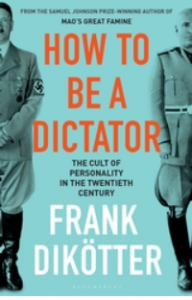
Personality of dictators


As the Democracy is on the defensive, civil freedoms and the role of law are being eroded in many countries, Parliament, free elections, political pluralism and independent media are under assault form strongmen rulers and illiberal populists, Dutch born Hong Kong based historian, Dikotter throw light into the era of modern tyrannies, much of the world was in an even darker place only a few generations ago.
Dikotter ilcudes Benito Mussolini, Adolf Hitler, Josef Stalin, North Korea’s Kim II Sung, Francois Papa Doc Duvalier of Haiti, Nicolae Ceausescu of Romania, China under Mao Zedong, Ethiopia’s Mengistu Haile Mariam.
No dictator can rule through fear and violence alone. Naked power can be grabbed and held temporarily, but it never suffices in the long term. A tyrant who can compel his own people to acclaim him will last longer by creating the illusion of popular support. Dikotter examines how a cult takes hold, grows and sustains itself and places the cult of personality where it belongs at the heart of tyranny.
Dikotter reveals that cult of personality lay “ at the very heart of Tyranny” in the previous century. Dictators tend to portray themselves as humbly born sons of the people, endowed with special talents and working tirelessly for the nation. Not unlike Vladimir Putin of Russia, Mussolini arrange publicity photographs of himself racing cars toying with lion cubs, addressing a crowd threshing wheat or playing a violin. He appeared as a fencer, yachtsman, swimmer and pilot.
Dictators would like to portray themselves as profound thinkers and wise rulers. Duvalier once remarked that “ When one is a leader, one must have a doctrine” was awarded the title of Grand Master of Haitian Thought for his collect works which elevated him to the level of Plato, St Augustine, Rudyard Kipling and Charles de Gaulle.
Mao posed as a renaissance man, a philosopher, sage and poet wrapped in one a calligrapher immersed in the literary tradition of his country saying “ Revolution is not a dinner party”, imperialism is a paper tiger and power comes the barrel of a gun”.
Tyrants trust no one , least of all their allies” according to Dikotter, citing example of Ceausescu and his “ dour, uncultured buy ambitious “ wife Elena “ detached from reality surrounded by the sycophants and liars they had promoted over the years, they had come to believe in their own cult”.
Hilter, Mussolini and Stalin all conned visiting foreign intellectuals and politicians into regarding them as reasonable men, not as the warmongers and organisers of domestic repression they actually are.
How to be a Dictator: The Cult of Personality in the Twentieth Century by Frank Dikotter, Bloomsbury £25, 304 pages.
